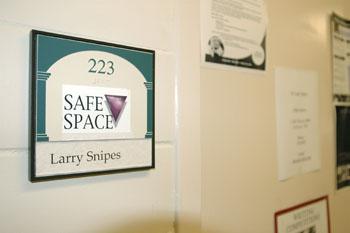The Safe Space Campaign, a program that provides a welcoming environment for people regardless of sexual orientation, went largely unnoticed after Spectrum Alliance disbanded last year. Candace Creecy, Safe Space coordinator, said she plans to increase the program’s visibility on campus this semester with more advertising directed toward students and professors. “This year is a new beginning for Safe Space,” Creecy said. “This year’s initiatives are to educate and train more faculty and staff as well as educate students here at LSU about [lesbian, gay, bisexual and transgender] issues and diversity issues as a whole through classroom visits as well as workshops.” Creecy said she also plans to help students reorganize Spectrum Alliance. “Members were panelists and educators in the training and were highly influential in the education of potential Safe Space hosts,” she said. Creecy said the program was “largely affected” by the student organization’s disbandment. “Members gave first-hand knowledge and real-life experiences to the trainings,” she said. “They allowed potential hosts to ask questions about their experiences and education about ways faculty and staff could be more accepting of others as well as being inclusive and fair in their classrooms.” Creecy said she is also working with members of Gays, Lesbians, Bisexuals and Supporters United, a social student organization, to increase Safe Space participation on campus. The Office of Multicultural Affairs funds Safe Space. Creecy said the program uses the funds for educational materials, videos, printing manuals and other Safe Space-related expenses. Creecy said Safe Space has not had any problems concerning funding since she became the program’s coordinator in October. “There could be a potential problem if we don’t spend the budget. They won’t be as willing to give us money,” she said. Creecy said Safe Space is an important program for the University. “For one, I don’t think any other program gives you that first-hand experience with people who identify as LGBT,” she said. “It helps widen views and educate people.” Creecy said people must go through a three-hour training session to become part of the Safe Space program with an option to be a host for the program. The program has trained 212 students, faculty, staff and resident assistants since 2001. According to the Safe Space training packet used in training sessions, Safe Space hosts “serve as an important resource, not only as allies, but also as resource referrals to help connect LGBT students to the LGBT community at LSU.” Creecy said people who want to become Safe Space hosts sign a pledge that “promises to uphold the ideals of the campaign.” Hosts receive a comprehensive Safe Space manual and sticker after completing their training program. The sticker has an upside-down, pink triangle logo and reads “Safe Space.” Creecy said the logo on the sticker “symbolizes acceptance expressed by those who support the equal treatment of gay, lesbian, bisexual and transgendered persons.”
“When you see one of these logos on an office door or work area, you know that it is a Safe Space for students who identify as gay, lesbian, bisexual, transgender and questions,” Creecy said. Lynn Kimball, residential life upper-class/traditional communities assistant director, became a Safe Space host in 2001 when she was the residential life coordinator in Kirby Smith. Kimball attended another session of Safe Space training in 2004 to refresh her knowledge about the program. She said she continues to support the program even though no one has gone to her for Safe Space assistance. “I like that my name is out there as someone who understands, supports and has their door open,” she said. “I wish I could help more, to be honest.”
—–Contact Angelle Barbazon at abarbazon@lsureveille.com
Safe Space program to increase campus visibility
January 25, 2007

A Safe Space sticker marks Larry Snipes name plate to his office. These stickers are issued to professors and people around campus who have completed the Safe Space training.



